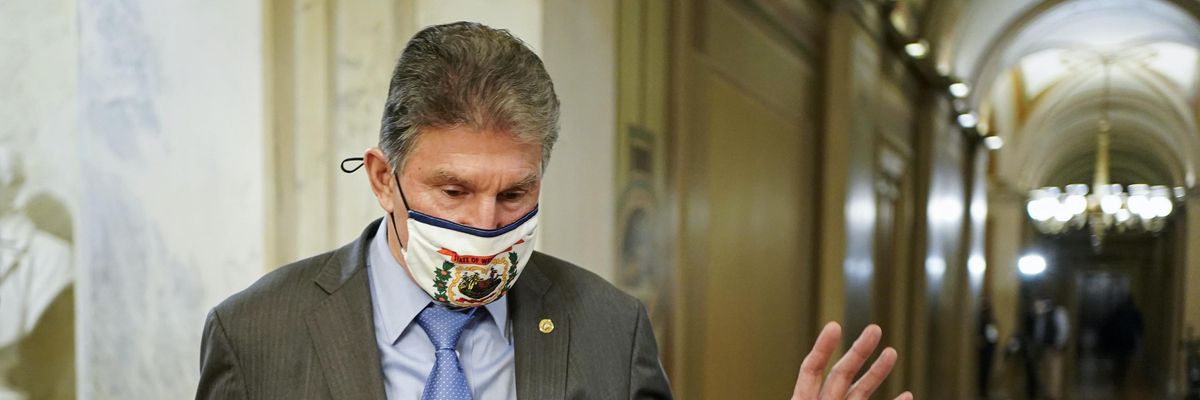Advocates for both workers' rights and climate policy are condemning Sen. Joe Manchin's latest statements opposing provisions in the Build Back Better Act, the $1.75 trillion social spending and climate action package that has already been substantially weakened due largely to the right-wing Democrat's objections to numerous anti-poverty and environmental measures.
Manchin's most recent
opposition is to tax incentives for electric vehicles made by American workers who are represented by unions.
"Our climate is running out of time--yet Manchin wants to stand in the way of affordable and sustainable solutions."
At an event last week with officials from Toyota, whose plant workers have no union representation, the senator
toldAutomotive News that incentivizing the purchase of electric vehicles from the only three auto companies with unions--the U.S.-based Ford, General Motors, and Chrysler--would be "un-American" and "wrong."
"We shouldn't use everyone's tax dollars to pick winners and losers," Manchin told the outlet at the event, where Toyota
announced it would be investing $240 million in a non-union West Virginia plant to produce hybrid vehicles.
Toyota and other foreign-run auto companies have been lobbying against the provision, while United Auto Workers (UAW) has expressed support. If passed as it's written now, the Build Back Better Act would
provide purchasers of electric vehicles with a maximum tax credit of $7,500, and would add a $4,500 credit on top of that starting if the vehicle is manufactured by unionized workers.
As
Eartherreported Monday, the tax incentive could have a major impact on Americans' ability to purchase vehicles not solely reliant on fossil fuels, as "price still remains the number one barrier in preventing new [electric vehicle] adoption."
A
2020 survey by Ipsos Global showed that consumers would be willing to pay only 10% more for electric vehicles. The tax credit would bring down the cost of some electric vehicles by $12,000 to around $20,000, far below the current average cost of about $42,000.
President Joe Biden
said last month that he wants workers and companies that benefit from the tax incentive to be "here in Michigan, not halfway around the globe."
Ray Curry, president of the UAW, said last month the tax incentive "would be a win for auto manufacturing workers" while also encouraging "nonunion manufacturers to let their workers freely organize."
Evidently, writer and attorney David Lurie
said, "Manchin thinks being pro-labor is un-American."
Joining Manchin in opposition to the tax incentive are Republican lawmakers including Sens. John Cornyn (R-Texas) and Roger Wicker (R-Miss.), whose states would also benefit from promoting the purchase of electric vehicles from non-union companies like Nissan and Tesla.
With the Senate evenly split between the Democrats and Republicans, Biden and Senate Democrats need Manchin's support to pass the Build Back Better Act--a dynamic that's directly resulted in the scrapping of provisions including the Clean Energy Performance Program and paid family and medical leave.
Now, said progressive campaign group Our Revolution, Manchin's opposition to the tax credits is "inexcusable."
"Our climate is running out of time--yet Manchin wants to stand in the way of affordable and sustainable solutions,"
said the group. "Shame!"

